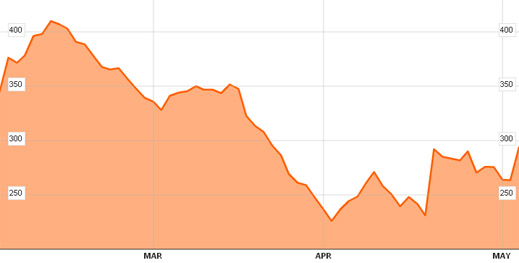
By John Helmer, Moscow
Righteous indignation is to investigative journalism what Joseph Goebbels was to truth. So what was really going on in the last days of April when the London media celebrated the Russians who this year topped the UK Rich List, but discovered something going badly, maybe criminally wrong at Eurasian Natural Resources Corporation (ENRC), a London-listed mining company controlled by three Kazakhs and the Kazakh government? If the London newspapers spell the name of one of ENRC’s owners, Alexander Mashkevich, in three different ways — Mahkevitch, according to the Telegraph; Machkevitch to the Guardian; and Mashkevich at the Financial Times and The Times — what to make of the reliability of the anonymous leaks, unseen documents and innuendo from the dismissed or the disgruntled, on which the media campaign against ENRC depends?
This isn’t a question to be answered right now. Instead, it’s what is already happening to take advantage of ENRC’s falling share price and market value that is in focus. For by the time the UK regulators get around to completing their investigations, and deciding what to do about them, the Kremlin will have intervened to coordinate and finance a multi-billion dollar takeover of control at ENRC. By then too, ENRC will no longer be a regulated entity on the London Stock Exchange (LSE).
ENRC publishes a list of the notices it is obliged by rules of the UK Takeover Code and the UK Listing Authority (UKLA [1]) to release to the market. (By the way, the Telegraph has trouble [2] spelling this one too, calling it the UK Listings Authority.) The notices are required by Rule 8 of the Takeover Code [3]; they are intended to prevent secret, collusive or insider dealing in shares to the disadvantage of public shareholders. A Rule 8.3 notice is required when share dealing takes place on the part of “any person who at the relevant time… is interested (directly or indirectly) in 1% or more of any class of relevant securities of any party to the offer.”
So far this year ENRC has issued ninety regulatory news notices, 80 of them since April 22. Read them all here [4]. On that day, BlackRock, the international fund manager, reported [5] that on April 19 it had been buying and selling ENRC shares at prices between £2.35 and £2.91. That was apparently the signal that well-informed people in the marketplace knew that ENRC was about to take a fresh beating in the press, and that betting on the recovery of its share price would be a clever and profitable thing to do. Here is what happened to the share price:
THREE-MONTH TRAJECTORY FOR THE ENRC SHARE PRICE

Source: Bloomberg
The chart shows that since the year started ENRC has hit a high of £4.10 on February 13 and then fallen by 44% to April 15, when the low was £2.29. Since then, as the trouble at ENRC appeared be getting decidedly worse among reporters who can’t spell, those with numeracy skills were pushing the share price upwards to a current level of £2.93; that’s a recovery of 28%. With 1.3 billion shares on issue, the downwards trajectory made ENRC’s market capitalization cheaper by £2.3 billion. For a buyer of shares at the April bottom, the upward trajectory over the past two weeks has added to the value about £800 million.
Among the share buyers with a big enough stash to qualify for a Form 8.3 notice, there are, in addition to BlackRock (1.36% as of May 3), the Government of Singapore Investment Corporation (1.07%), Skagen Funds of Norway (1.11%), and Suleiman Kerimov (3.06%). In the fortnight BlackRock and the Singapore Government have been net sellers – they have ended up with fewer shares in ENRC than they started with.
This notice [6] of April 26 from Societe Generale reveals that ENRC’s control shareholders – Mashkevich, Patokh Chodiev, and Alijan Ibragimov – were also very busy buying and selling ENRC shares, apparently with Kazakh Government participation.
Kerimov is likely to have known what they were doing. He appeared by disclosing on April 29 that he had become the owner of 36.9 million shares for a stake of 2.86%. This notice doesn’t identify what price he paid. Further share-buying notices follow on April 30, May 1, and May 3. The April 30 notice reveals Kerimov paid £2.72 per share; the May 3 notice reveals he paid £2.60. In all, Kerimov is now reported to be holding 2.43 million shares (3.06%). With the recent take-off in share price, this stake is now worth about £92 million ($143 million).
Kerimov operates holding companies in Moscow and Switzerland, and he is precluded by the rules of his Russian parliamentary status – he is one of two senators for Dagestan in the Federation Council – from actively directing his business. So he doesn’t answer directly to questions about the business. Nor does he answer questions about his politics. To comply with an impending Russian statute limiting elected Russian officials from holding assets offshore, Kerimov has put those assets in a Swiss trust. That’s managed by the same Studhalter family who have been taking his business orders for years. Read about them here [7].
By tracking the movement of Kerimov’s aircraft, it’s possible to see how far afield he goes from Russia in representation of the interests of his ENRC, er, Dagestani constituency. On March 30 he flew from Phuket in Thailand to Moscow, and remained on the ground until April 28. He then flew to the UK for a meeting and on to St. Petersburg on April 29. He was in Moscow on April 30, and then in Bodrum, Turkey, on May 1. His motor yachts were on charter at Barcelona and San Diego (US) during this period.
Sources familiar with Kerimov’s business claim that Kerimov didn’t pay for the 2.86% shareholding in ENRC he disclosed initially. That, the sources claim, had been originally held by a unit of Stephen Jennings’s Renaissance Capital group. How Jennings went bust late last year and applied to Kerimov for a bailout was reported here [8]. Some time after Jennings’ exit from Russia, the sources claim, Kerimov, along with co-creditor of Jennings, Mikhail Prokhorov, took over the ENRC shareholding after Jennings had forfeited.
How it then happened that Prokhorov and Kerimov decided between themselves to assign the asset to Kerimov, so that Kerimov would become the owner of record on the LSE, isn’t known. If Kerimov paid Prokhorov for the stake is also not known. If there was a transaction between them ahead of the April 29 report to the LSE, then it’s likely to have cost between $130 million and $150 million. For such a sum, the sources believe Kerimov must have borrowed from a bank, probably a state-controlled Russian bank.
Kerimov’s spokesman at Nafta Moskva refuses to say how Kerimov came by the initial ENRC stake; whether he has been borrowing to fund the extra share buying; and if so, from whom.
But Kerimov never acts alone, now are his silent partners ever in the dark. According to this notice [9], dated May 3, the control shareholders of ENRC are planning an offer to buy ENRC shares. Exactly what the offer is has yet to be revealed; it is widely believed to be a buyout of the public shareholders, with the outcome that ENRC will be delisted from the LSE, and become a private company once more.
The offerors, according to the notice, are Mashkevich (14.6%), Chodiev (13.1%), Ibragimov (14.6%), and the State Property Committee of Kazakhstan (11.7%); altogether, a majority of 54%. In addition, the notice reveals the names of four “concert parties” – that’s groups allied with the offerors, and in on their scheme. One is Chodiev’s daughter Mounisssa, the head of press at ENRC (0.039%); another is the sovereign wealth fund of Kazakhstan, Samruk-Kazyna (0.07%).
Then come the Russian state banks – Sberbank is listed with a stake already of 0.06%, and VTB Capital, which reportedly has no shareholding in ENRC.
(Also unmentioned in the notice as a concert party to the share buyback is Kazakhmys, the Kazakh copper miner also listed on the LSE. It controls 26% of ENRC, and has been obliged to write down the value of that asset as ENRC’s share price has fallen. Kazakhmys’s share price has fallen as a result.)
VTB was asked to clarify whether it has loaned Kerimov the money to buy his 3.06%, and whether it has a direct or indirect security interest in those shares. The bank won’t say. Sources familiar with VTB and its chief executive, Andrei Kostin, believe he has taken instruction from the Kremlin on the role VTB should play in the next stage of ENRC’s ownership. Sberbank, run by German Gref, is believed to be taking the same orders. Kerimov is believed to have met with one or both of these men to discuss the ENRC buyout. Sberbank is also refusing to respond to questions.
The name at the bottom of the offer notice is Amanda Keelan. She is an employee of the law firm Clifford Chance. Keelan was asked to clarify the involvement of VTB and Sberbank as concert parties. She was also asked to explain Kerimov’s involvement with them as an unidentified concert party, or as a free rider. She refused to answer.
For the Kremlin to come to the rescue of the Kazakh Government, as the three ENRC oligarchs lose their credibility in the London market, is more than comradely or philanthropic. The Financial Times quotes anonymous sources (“industry specialists”, “two people familiar with the situation”) as believing that VTB and Sberbank will finance the buyback of ENRC shares, secured by a combination of shares and an undertaking from the Kazakh government to guarantee repayment. According to the FT version, the Russian banks will be financing Mashkevich, Chodiev and Ibragimov. The London Times claims, without a source, that VTB and Sberbank “have been hired by the three central Asia tycoons” who have created a special-purpose vehicle to buy up the 15% of shares still in the free float.
Kerimov’s involvement in the scheme is a sign that this isn’t what is happening. It’s possible but unlikely, Russian sources in the know believe, that Kerimov is acting alone, in order to take profit from inside knowledge of the Kremlin-backed buyback at a higher share price than he has paid.
Rather, it is believed the combination of the Russian state banks with Kerimov as front-man indicates another scenario of what is about to happen. This, according to Moscow and London sources familiar with the Russian strategy, is that there has been a joint decision by President Nursultan Nazarbayev and Vladimir Putin to secure the future of ENRC.
If they have agreed, it would not be unprecedented. In the past when Alisher Usmanov attempted to put takeover pressure on ENRC, the Kremlin sided against him with the Kazakhs. In a more recent conflict between Victor Rashnikov and ENRC, the Kremlin stayed out of the dispute – it did not take sides with the Russian.
By contrast, Kazakh suspicion of Russian oligarchs surfaced last month in the release of ENRC’s annual report [10] for 2012. There ENRC accuses Oleg Deripaska’s Rusal of price gouging, blaming Rusal for inflicting “onerous” terms for deliveries of alumina to Rusal’s Russian smelters. The report says ENRC was forced to take a loss of $328 million on its alumina business, with a further $10 million asset “impairment”.
Can the Kazakhs have been persuaded to entrust their future to Kerimov? Has the buyback plan been decided with Russian state bank funds, without a change in the control of ENRC hitherto exercised by Mashkevich, Chodiev and Ibragimov? Exactly what that change might entail – fewer shares, loss of operational control – the sources admit they aren’t sure.
On the outcome Mashkevich has been reported at home as saying last Friday [11]: “Us leaving the business in Kazakhstan? This is out of the question.”